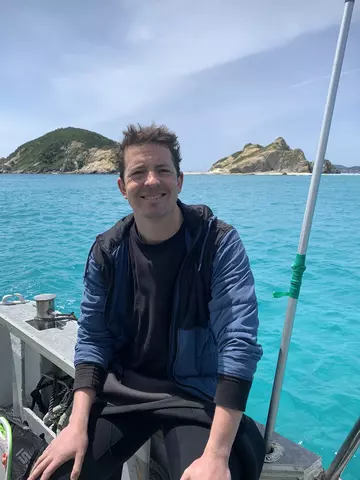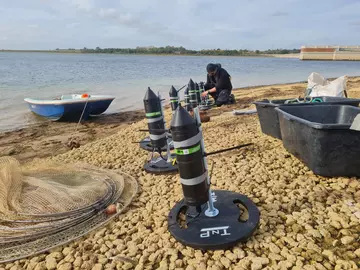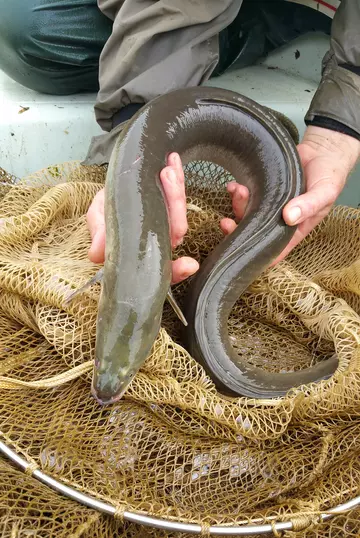
Movement ecology
Satellite remote sensing
Institute of Zoology
Zoological Society of London
London
NW1 4RY
Dr Michael Williamson's work aims to investigate and address the conservation challenges of co-existence between wildlife and people, and mitigating the impacts of climate change on biodiversity.
Michael is interested in using tagging technologies and remote sensing to investigate the movement ecology of marine and freshwater fauna, and how this is influenced by environmental drivers, anthropogenic disturbance and climate change.

By monitoring movement of aquatic species, we can gain better insights on where animals move, what areas and habitats are most important to them and what drives changes in their movement patterns. This will inform our understanding on how movement in aquatic species overlaps with, and is impacted by, human activities. This could include investigating how eels navigate anthropogenic structures on migration, how fish change movement patterns due to fishing activities, and how cetaceans are impacted by anthropogenic noise in marine environments. These studies will also aid predictions in how movement aquatic animals is being altered by climate change, such has how reef shark movement has been altered by warming oceans and bleaching of coral reefs. The information and science generated from Michael's research is important to help inform and aid conservation and management policies for aquatic species in marine and freshwater environments, both of which are currently under significant threat from anthropogenic activities and climate change.

Knowledge of movement patterns in wildlife is incredibly important for conservation. Without knowing where animals move, we cannot designate areas or policies to protect them. Information on movement is surprisingly lacking in many species, particularly in aquatic environments where movement is particularly hard to track. Where movement patterns are understood, it is often concentrated on just a handful of species. Studying a wider range of species, and gaining insights into their movement patterns, which is then used to inform protective area design will be one of the key methods to help win the fight to save wildlife.

If you're interested in Michael's work, and the work of the Fish Movement Ecology Group, please free to contact us (michael.williamson@ioz.ac.uk) or visit our website.
Williamson, M.J., Tebbs, E.J., Curnick, D.J., Ferretti, F., Carlisle, A.B., .…. Jacoby, D.M.P. (2024). Environmental stress reduces shark residency to coral reefs. Commun. Biol. 7, 1018. https://doi.org/10.1038/s42003-024-06707-3
Williamson, M.J., Jacoby, D.M.P., Bašić, T., Walker, A., Piper, A.T. (2024). Social network analysis as a tool to inform anguillid eel conservation and management. ICES J. Mar. Sci. fsae001. https://doi.org/10.1093/icesjms/fsae001
Iwata, T., Aoki, K., Miller, P. J. O., Biuw, M., Williamson, M. J., & Sato, K. (2024). Non-lunge feeding behaviour of humpback whales associated with fishing boats in Norway. Ethology, 130, e13419. https://doi.org/10.1111/eth.13419
Dunn, N., Curnick, D.J., Carbone, C., Carlisle, A.B., Chapple, T.K., Dowell, R,. Ferretti, F., Jacoby, D.M., Schallert, R.J., Steyaert, M., Tickler, D.M., Williamson, M.J., Block, B.A., Savolainen, V. (2023). Environmental DNA helps reveal reef shark distribution across a remote archipelago. Ecol. Indic. 154: 110718. https://doi.org/10.1016/j.ecolind.2023.110718
Williamson, M.J., Pike, C., Gollock, M., Jacoby, D.M.P. & Piper, A.T. (2023). Anguillid eels. Curr. Biol. 33: R888-R893. https://doi.org/10.1016/j.cub.2023.07.044
Williamson, M.J., Jacoby, D.M.P. & Piper, A.T. (2023). The drivers of anguillid eel movement in lentic water bodies: a systematic map. Rev. Fish. Biol. Fisheries. https://doi.org/10.1007/s11160-022-09751-6
Williamson, M.J., Tebbs, E.J., Dawson, T.P., Thompson, H.J., Head, C.E.I. and Jacoby, D.M.P. (2022). Monitoring shallow coral reef exposure to environmental stressors using satellite earth observation: the reef environmental stress exposure toolbox (RESET). Remote Sens. Ecol. Conserv. 8: 855-874. https://doi.org/10.1002/rse2.286
Williamson, M.J., Curnick, D.J., Jacoby, D.M.P., Durant, S.M., & O’Neill, H.M.K. (2022). Ethical considerations in natural history film production and the need for industry-wide best practice. Glob Ecol Conserv. 34: e01981. https://doi.org/10.1016/j.gecco.2021.e01981
Curnick, D.J., Davies, A.J., Duncan, C., Freeman, R., Jacoby, D.M.P., Shelley, H.T.E, Rossi, C, Wearn, O.R., Williamson, M.J. & Pettorelli, N. (2021). SmallSats: a new technological frontier in ecology and conservation? Remote Sens Ecol Conserv. 8: 139-150. https://doi.org/10.1002/rse2.239
Williamson, M.J., Ten Doeschate, M.T.I., Deaville, R., Brownlow, A.C., & Taylor, N.L. (2021). Cetaceans as sentinels for informing climate change policy in UK waters. Mar Policy. 131: 104634. https://doi.org/10.1016/j.marpol.2021.104634
Williamson, M.J., Tebbs, E.J., Dawson, T.P., Curnick, D.J., Ferretti, F., Carlisle, A.B., .…. Jacoby, D.M.P. (2021). Analysing detection gaps in acoustic telemetry data to infer differential movement patterns in fish. Ecol Evol. 11: 2717-2730. https://doi.org/.1002/ece3.7226
Hays, G.C., Koldewey, H.J., .… Curnick D.J. (2020) A review of a decade of lessons from one of the world's largest MPAs: conservation gains and key challenges. Mar Biol. 167:159. https://doi.org/10.1007/s00227-020-03776-w
Williamson, M.J., Tebbs, E.J., Dawson, T.P., & Jacoby, D.M.P. (2019) Satellite remote sensing in shark and ray ecology, conservation and management. Front Mar Sci. 135. https://doi.org/10.3389/fmars.2019.00135
Williamson, M.J., Dudgeon C., & Slade, R. (2018). Tonic immobility in the zebra shark, Stegostoma fasciatum, and its use for capture methodology. Environ Biol Fish. 101: 741-748. https://doi.org/10.1007/s10641-018-0734-2
Kavanagh, A.S., Owen, K., Williamson, M.J., Blomberg, S.P., Noad, M.J., Goldizen, A.W., Kniest, E., Cato, D.H., & Dunlop, R.A. (2016). Evidence for the functions of surface-active behaviours in humpback whales (Megaptera novaeangliae). Mar Mamm Sci. 33: 313-334. https://doi.org/10.1111/mms.12374
Williamson, M.J., Kavanagh, A.S., Noad, M.J., Kniest, E., & Dunlop, R.A. (2016) The short-term effect of tagging activities by small research vessels on the behaviour of humpback whales (Megaptera novaeangliae) Mar Mamm Sci. 32: 1234-1253. https://doi.org/10.1111/mms.12324
